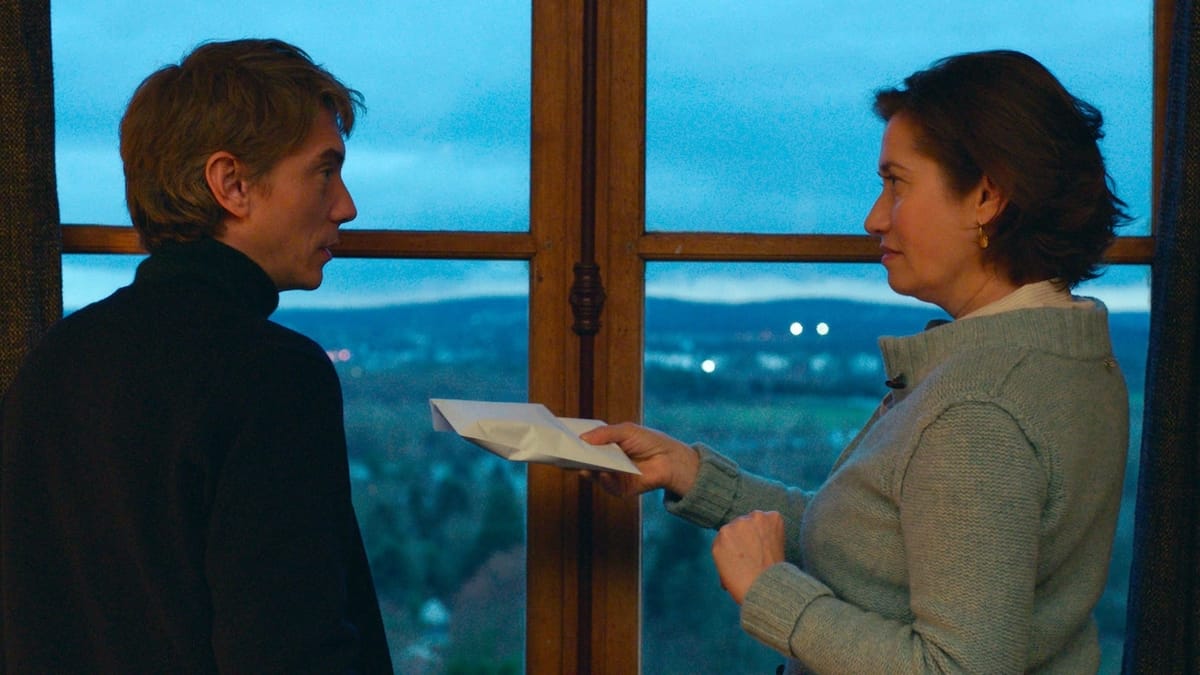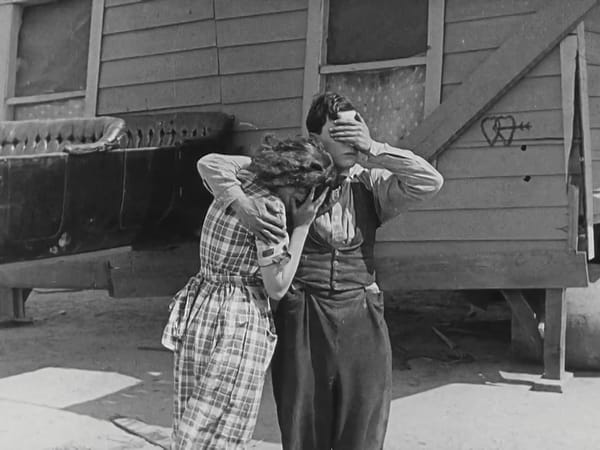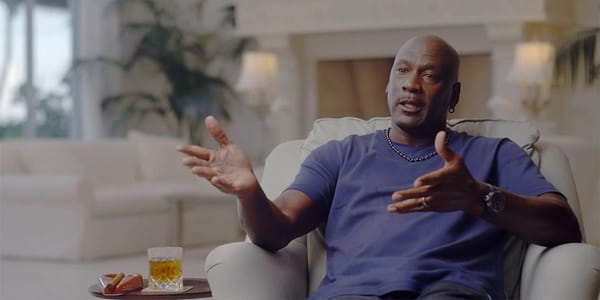The things we do for love

In Claire Simon's I Want to Talk About Duras, love is a role to play
Brian De Palma's Body Double is most often discussed as a film about film viewing and the illusion of control that voyeurism offers. When Craig Wasson’s Jake Scully indulges in watching his sexy neighbour through a telescope, this usually meek and timid man suddenly feels powerful, looking at her without her knowledge. But in the same way that the film viewer isn’t in fact an unseen voyeur, Jake isn’t an unseen observer: it turns out that this whole erotic spectacle was orchestrated especially for him.
Yet maybe even more fascinating than its metaphor for the illusory power of voyeurism is Body Double’s take on role playing. Paralysed by fear every time he has to do something, Jake Scully can only act when he is playing a part, pretending to be someone he is not. Telling himself that the situation he’s in is a scene from a movie is the only thing that allows him to overcome his crippling anxiety. De Palma’s film offers a bleak alternative to Hollywood’s usually inspirational stories about people overcoming their fears to achieve great things, one with bone-chilling implications about the value and power of authenticity and identity. What is to happen to the real, shy, nebbishy Jake Scully?
Although operating in an entirely different register and genre, Claire Simon’s I Want to Talk About Duras offers a similarly haunting look at ways of being in the world and the tension between passivity and action, truthfulness and performance.
The film is based on the book Je voudrais parler de Duras, which gathers two interviews that French journalist Michèle Manceaux conducted with Yann Andréa, then-partner of French writer Marguerite Duras, during two days in October 1982. “Interview” may not be the right word however, seeing as Manceaux rarely speaks and Andréa talks about his relationship with the writer in an almost uninterrupted monologue. Already, the notion of passivity is present in the position of the journalist, who becomes a receptacle for this man’s thoughts at his own request — all she really does is press a button on her tape recorder. And like her, we the audience are passive listeners.
It’s a highly unusual position for a film viewer to be in: we are simply watching someone talk about things that have already happened, with very little chance of anything “new” occurring to disrupt the flow of the largely one-sided conversation. There is very little action to speak of as the camera slowly moves left and right to film the two characters. Yet my first impression was of how pleasurable this felt: there is a sense of freeing abandon in surrendering to a person’s words, in simply listening with no chance to talk back and no need to come up with any answer or reaction. But I wouldn’t be here writing about this film if it had completely turned my brain off: my passivity was a choice, and it was a productive one. Although I gave the film my time and my attention, I of course was also given something in return. This is true of all good films, but especially of this one heavy in monologues, which more than most others really did feel like reading a good book.
Probably not incidentally, it seems Andréa had exactly this kind of relationship first with Duras’ writing, and then with Duras herself. He relates his obsession with her work, how nothing else other than her books existed for him as soon as he read his first Duras novel. This state of subjugation was not exactly something he could control — it was an infatuation, it was love — but as he speaks to Manceaux about these first impressions from some years ago, he recalls feeling what he still feels at the time of the interview: that this state was infinitely preferable to any other possible alternative. It was a state of subjugation that he, to some degree, chose because it gave him something he could not have otherwise. Although his relationship with Duras marks the beginning of his passivity — he quit school, left his town and effectively lost contact with all the people he knew — he describes it as the true beginning of his life.
After meeting briefly at a screening of Duras’ film India Song in 1975 — at which, hilariously, Andréa during the Q&A had “more of a comment than a question” — the writer gives her fan her actual address for him to write to her, and thus begin five years of an exclusively epistolary relationship. But there, too, the exchange was unbalanced and almost entirely one sided at any one time. Andréa talks about how he immediately started to write to her “all the time,” and kept doing it even though she never once wrote him back. When he stopped due to not loving her most recent book as much as the others, she became the one to write relentlessly, though only for a few months before he started again.
Although he of course preferred it when she wrote back, Andréa apparently was not writing her letters only in the hope that she would respond. There was something else pushing him to do it, and it would be simplistic to reduce that to despair alone. Already, Andréa had chosen to make his entire life, his every word, his whole self revolve around Duras; whether she acknowledged that or not was not really his concern.
Once he finally visited her and she asked him to stay, he naturally did: they lived together from 1980 until Duras’ death in 1996. In the film, he describes the way she then took even more control over his life by dictating what he would wear, eat, read and talk about, and even as he is saying this, Andréa is aware that her treatment constitutes abuse and cruelty. He knows it just as he knows that he cannot escape it: he talks about how he did try to leave several times, but always found himself feeling more alone and miserable once waiting for his train, and would always go back to her. Ultimately, he considers what he gets out of this relationship worth the price of his entire self, and just as he describes Duras as demanding, impatient and abusive, he also calls her loving, tender, passionate and kind. In one particularly powerful moment, he talks candidly about how she would give herself completely during sex, which resulted for him in such pleasure that even though he was not a virgin before meeting the writer, he considerd his first time with Duras to be his first time, full stop — “I don’t think I’d ever made love before I met her.” Here, his submission is precisely what gives him pleasure; the way he describes it, his servitude and his happiness are inevitably intertwined.
In another moment, he goes so far as to undermine the very idea of a “he,” talking about his pre-Duras self as a sort of vague nothing. All the while, he is also aware that to the eyes of the outside world, he isn’t much of a person now, just another creation by Duras. Yet what matters to him the most is to be a person in her eyes, and that means being exactly as she wants him to be. By contrast, he only wants Duras as she is, and she established the terms of the relationship very early on: “She offered herself to me completely, saying ‘this is who I am, and you must accept it all.’ And I accepted it all.”
His limited agency lies in his words, and in telling his story to Manceaux. As played by Swann Arlaud, Andréa is a calm but extremely self-aware person, who talks deliberately, in great detail and with no apparent shame about many details of his life. Although his story is one of self-abnegation, it does not make him retreat into himself during the interview. In fact, as he explores the impact that the writer has had on him, he suggests that she is the one who has given him the tools to finally see and describe himself. Talking of the first time he read a Duras novel, he says of her writing that it was like a complete revelation, that it had the power of truth itself.
Manceaux, played by Emmanuelle Devos, is a stand-in of sorts for the audience, and though she shows little emotion during the interviews, Simon hints at the ways this unusual love story impacts the journalist. We follow her on her way home at the end of the first day, and the quiet outdoor exteriors she walks through stand in sharp contrast with the atmosphere in Duras’ room. The break feels like a respite, and Manceaux appears somewhat relieved when she gets home. But then her boyfriend appears, and though there is no sign of abuse or cruelty whatsoever, this inevitably makes one reflect on just how unusual the Andréa-Duras dynamic really is. I Want to Talk about Duras paints the portrait of a man who believes he is at his most authentic and alive when playing the role given him by his lover. But perhaps what is most disturbing about it is his awareness of this and his ability to put into words something that is far from exclusive to somber French novels or Hitchcock homages, and far from black-and-white.




